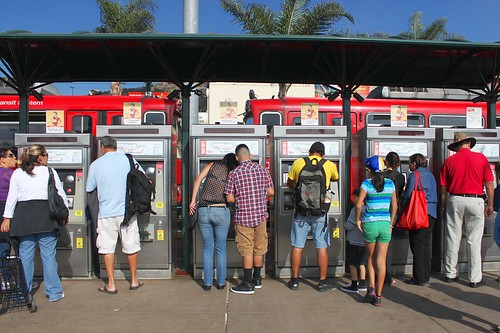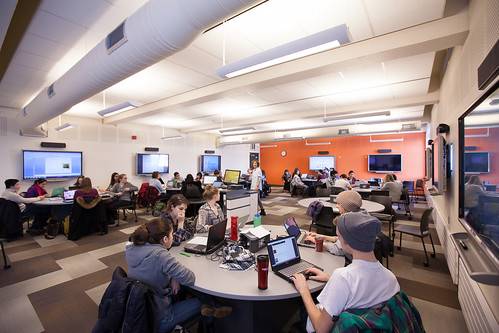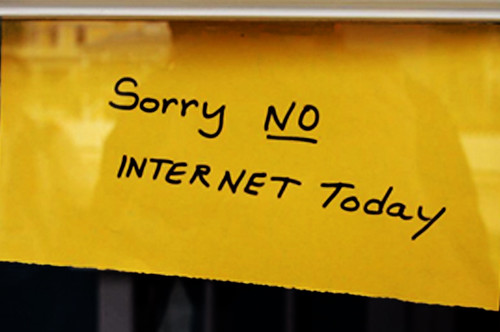Assorted thoughts and reflections on technology in education, and other things ...
Sunday, September 29, 2019
How dare you! What future do we offer our children?
This short speech by Greta Thunberg at the United Nations climate summit this week has shaken me. I've been increasingly depressed by how the world's leaders and decision makers continue to pay no more than lip service (at best) to the urgent demands from scientists and experts for concrete action to prevent the disastrous effects of massive climate change. But this short speech spells out the message better than any scientific report. We're in danger of triggering a disastrous and irreversible process and those who can actually do something about the situation continue with a message of business as usual, in some cases denying that the problem even exists. At the same time, the scientific facts were made even clearer as the IPCC published its Special Report on the Ocean and Cryosphere in a Changing Climate, outlining the potentially disastrous effects of global warming to the marine environment with severe flooding, collapse of fishing and increase in severe weather phenomena. The message couldn't be clearer.
Greta points the finger not only at world leaders but also at all of us. We have all contributed to the mess and it's our responsibility to do everything we can to avert disaster. We talk so often about our children's future but now when the children are begging us to offer them a future the world seems suddenly paralysed. The solutions are there, the science and technology are available but the will to change is absent. Yes, there are millions protesting and many are trying to adjust our lifestyles, but the majority are simply continuing as normal, assuming that it will somehow work out well in the end. In all disaster movies, no-one listens to the lone scientist who warns of the impending danger. The mayor insists that the show must go on and scoffs at the idea of a giant shark/mutant piranhas/monsters/aliens coming to spoil the festivities. Sounds familiar today doesn't it? In the movies the lone scientist manages to save the day at the last minute, but I'm not sure this is a realistic scenario.
I have made some changes to my lifestyle in the last couple of years but admit that they are mostly cosmetic. Like most people, I'm still leading a comfortable lifestyle and following ingrained habits. I have often questioned whether not flying or eating less meat will make the slightest difference to the situation. The airports and planes are still packed, new massive shopping malls are opened every day, the annual consumer feeding frenzy of Christmas is already under way and the world's forests are disappearing rapidly. We seem to be consuming ourselves to extinction.
The role of education is absolutely vital to make people aware of climate issues and many educators are already making valuable contributions. But this is a global issue and needs international coordination. A major obstacle is the countries who actively discourage discussion of environmental issues even in schools or suppress any movement that may question or threaten the government's control. Even in the richest nations science and education are under threat since the solutions to the climate crisis threaten the profits and even existence of massive multinational corporations. The backlash we are seeing just now is savage and therefore it is essential that everyone in the education field is conspicuous and active in the public debate (where such action is allowed). Educators and scientists must react publicly to provide facts to debunk the conspiracy theorists and deniers. But we can't do this alone, we need political support. The saddest part of all this is that I see very few political leaders who are willing to step forward seriously and this is the core of Greta's message. She has power to influence but we need bold politicians who can do the real work. I can't see anyone willing to take the lead at the moment.
Saturday, September 21, 2019
Digital by default - who is excluded?
I like to think that I am fairly comfortable with digital tools and platforms, but I feel a backlash growing inside me when the digital option is pushed into my face. Here in Sweden for example, cash has become almost obsolete, there's an app for everything and shops are becoming increasingly self-service. When a shop forces you to use those awful self-service checkouts, or you can only pay for parking by downloading the special app (that I as a visitor to the town will probably never use again), or when you arrive in a new city and are faced with the challenge of negotiating the often complex automatic ticket machines (offering you a myriad of options but never the one you are looking for). The hours I have wasted on such frustrating processes that an old-fashioned human contact would have solved in seconds.
I sometimes feel I'm the only one who feels like this, but received welcome support from a post by James Clay, Digital should be a choice… The new digital solution may be welcomed by many but we also need to consider who we are excluding by installing even more self-service machines or apps. Offer us a choice and we can maybe accept the change in time, but if there is no choice people will suffer.
We often forget that sometimes people don’t like innovation and innovation doesn’t automatically always mean better. Actually most of the time innovation for a lot of people is rarely better. Sometimes its worse than what was before, most of the time it’s just different.
I simply don't want to install new apps every week that clog up my mobile's limited capacity and that I only use a handful of times a year at most. Most buses are now cashless and if you don't use the app or have a prepaid card you are punished by paying a high price for a single ticket from A to B. In many self-service shops there is a forest of machines and one manual checkout with a long queue (curious isn't it?). At one railway station with only self-service ticket machines I saw several members of staff who spent all their time helping bewildered travellers to use the machines!
James Clay applies this to education where an increasing amount of services on campus are being migrated to kiosks or chatbots. What about students or staff who for some reason can't or don't wish to go digital in this way. Is there any real person I can ask? What do I do if I don't have a mobile that supports the latest app? Some tech companies have rationalised all traces of personal contact from their customer service, replacing it with vast FAQ pages and self-help discussion forums. Sometimes I have a problem that isn't covered there or I'm not prepared to spend the next two hours combing through the site to find an answer. I just want a quick answer. Of course I can check in myself at a hotel and do everything by app but I do like to meet a person who smiles and can answer my questions (no, I don't want a humanoid robot at the desk either, no matter how polite they may be).
Whenever we innovate we need to consider whether we are excluding anyone and ensure that we have an option for them.
Saturday, September 14, 2019
The illusion of learning - from lectures to active learning
If you look back to your school and university days you sometimes realise that the demanding and tough teachers you disliked so much at the time actually taught you more than the ones you liked. Activities that were challenging and uncomfortable at the time were with hindsight much greater learning experiences than more orthodox classroom methods. In short, we are not very good at recognising a learning experience. This puts into question the validity of student course evaluations where challenging teachers and activities are often given low scores.
This discrepancy is studied in an article in the Harvard gazette, Study shows students in ‘active learning’ classrooms learn more than they think. Many studies show that students appreciate lectures and see them as valuable learning experiences whereas they are often more skeptical to active, collaborative learning. The Harvard study compared student attitudes to traditional lectures with active learning classrooms and showed that although the students rated the lectures more highly, the test results showed that they actually learned more by active learning. A well-structured and professional lecture can be very enjoyable and create the illusion that you have learned a lot. But, of course, the learning happens when you start grappling with the issues yourself and with colleagues. The collaborative element is less clear-cut than the crisp lecture format and involves messy problem-solving and negotiation. We may not realise how much we have learned till much later. According to the lead author of the study, Louis Deslauriers:
“Deep learning is hard work. The effort involved in active learning can be misinterpreted as a sign of poor learning,” he said. “On the other hand, a superstar lecturer can explain things in such a way as to make students feel like they are learning more than they actually are.”
The lecture is still a symbol of higher education and in popular culture any reference to universities inevitably shows a lecture hall filled with students eagerly making notes on the professor's lecture. Students still expect university to be like this and are often disappointed if they don't have any lectures on a course. A good lecture can indeed act as an inspiration and a starting point for investigation but it is in the messy process of negotiation, meaning-making and problem-solving that the real learning takes place.
... the study shows that it’s important to ensure that neither instructors nor students are fooled into thinking that lectures are the best learning option. “Students might give fabulous evaluations to an amazing lecturer based on this feeling of learning, even though their actual learning isn’t optimal,” he said. “This could help to explain why study after study shows that student evaluations seem to be completely uncorrelated with actual learning.”
The key lies in helping students realise the value of active learning by explaining the process and introducing the methods step by step. At the same time it is a major step in the dark for many teachers who are justly proud of their ability to lecture and get excellent evaluations from doing so. Why change a winning formula that the students clearly appreciate? There's a chain reaction here where teachers need support to adapt to a new teaching method and the students in turn need support to adapt and learn to appreciate the new method.
Measuring actual learning versus feeling of learning in response to being actively engaged in the classroom
Louis Deslauriers, Logan S. McCarty, Kelly Miller, Kristina Callaghan, Greg Kestin
Proceedings of the National Academy of Sciences Sep 2019, 201821936; DOI:10.1073/pnas.1821936116
Tuesday, September 3, 2019
Online learning - unplugged
How can digital educational resources benefit those without internet access (about 3.2 billion people according to Internet World Stats) or even without electricity? Open educational resources (OER) are available in hundreds of languages but they don't help those who cannot access that material. The real potential of online education is making it accessible for all - even offline.
There are many examples of this around the world where online material is downloaded where bandwidth is available and then used offline in remote regions, but one particularly interesting example I found is described in an article in Campus Technology, Distance Learning Without Computers, It describes a project called Education for Humanity run by Arizona State University in collaboration with a number of humanitarian agencies where online higher education is offered to students in refugee camps in Uganda. These camps often lack both electricity and internet access so the solution involves a device called a Solar Powered Educational Learning Library (SolarSPELL - see film below). This device stores downloaded educational resources from the university (or any other source) and uses the open source learning management system, Moodle, for course delivery. It is powered by solar energy and can support up to 17 mobile devices on its local wifi network. The device is cheap and portable and has been used in many projects around the world including this one in Uganda. The solution allows students to access material, interact and navigate an online course in the same way as they would with internet access. Where possible, online interaction can take place using mobile devices and Whatsapp.
There are some interesting conclusions to this project. Firstly, students who studied ASU's course on agribusiness performed much better than average with some getting extremely high grades. Motivation was of course extremely high since the students all depended on agricultural business and had immediate practical use for what they learned. Being able to immediately test what you have learned in real life situations contributes enormously to completion rates.
Another valuable result of the project was that they developed their digital literacy skills, despite being unplugged. The offline environment was as close to the online version as possible and this gave them confidence for the future.The students clearly saw the benefits and motivation rose accordingly.
Besides the improvements in students' marketing and financial analysis skills, an unexpected outcome was a boost in digital literacy, Bauer noted. "Although the facilitators were actually in charge of powering up the boxes and being in charge of the technology, they really gave students the option to learn how it works, why it works that way and how the WiFi [in SolarSPELL] was different from the one that they may use to access the internet. We saw their confidence in their digital literacy levels improve, in terms of feeling comfortable in working with technology. And the facilitators were telling us about how excited students were to come in every day.
Because of the limited number of devices that can share the local wifi capacity, many students had to share a laptop or tablet. This proved to be beneficial because it added an element of collaboration that would have been lost if there had been one device per student.
One area of particular interest is the way people who were forced to share a computing device in the pilot project were also forced to work together. "We'll see what the data says, but it will be interesting to [find out] exactly how that collaboration might have improved grades and helped people's understanding.
In developed countries we often fail to discover the benefits that can arise from relative scarcity of resources. Sharing devices forces students to share their ideas and negotiate a solution to the problems they are trying to solve. This could easily be implemented in more connected classrooms to foster better collaboration skills and mutual support.
The course literature had to be revised and adapted to the local situation and OER was the solution. The publisher of the textbook used for the regular course at ASU did not allow the book to be distributed digitally, so the teachers replaced it with OER which they adapted to match more closely the target group's needs. This is another good example of the vital role that OER can play in widening the reach of education, especially through adaptation.
Maybe another success factor for offline digital education is the absence of distractions, allowing students to concentrate on the task in hand rather than be tempted into checking the latest messages. Even in our always connected world we need to learn how to focus and this can be done by temporarily disconnecting or limiting connectivity. Sharing devices with limited or no internet access could have some benefits. Less is more as they say.
Subscribe to:
Comments (Atom)


